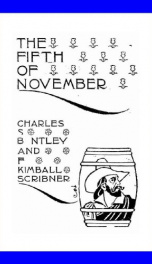the fifth of november a romance of the stuarts

From Content: "Snow had fallen through the day, and as night approached all objects were covered with a mantle of white. The noises incident to the life of a great city had long since become muffled and indistinct. The footfalls of those who traversed the streets could no longer be heard; and the only sounds which now and again broke the silence, were the voices of my lord's link-men, who, in goodly number, fully armed, carrying flaming torches whose lurid dancing light shone through the blinding snow, appeared at a distance to be a party of ancient saints come forth from their tombs to indulge in a ghostly frolic under cover of the night. The voices of the men, falling upon the snow-laden air, sounded dull and echo-less as they heralded the approach of a chair to some sharp turn or gateway. An armed escort in those days was no mark of royalty or distinction, for it was not well or safe for men to travel the streets alone after nightfall, as many a sinister face and cloaked form lurked hid in the shadow of secluded corners and dark by-ways, awaiting opportunity to cut the purse, or the throat, as need be, of the solitary wayfarer. Numbers were no guarantee of escaping unmolested; for of late the rogues had become so bold that it was a common thing for a party of gentlemen to be attacked successfully, as the ruffians mustered in their ranks many soldiers of fortune who had served in Flanders, France and Spain, and were well versed in the play of both sword and dagger. These acts of robbery and murder were confined to no one locality, but the vagabonds who perpetrated the deeds had haunts and places of common rendezvous, and as night fell, these dens poured forth upon the town their murder-bent crews. In one of the most narrow and crooked of streets, often lost amid the winding of greater thoroughfares, and safely hidden from the watchful eyes of the King's soldiers, was situated a tavern, patronized for the most part by those who replenished their purses when low, by running some belated traveler through the back, and taking what money he had. This tavern was famous among its patrons for its mulled ale, the like of which, they swore could not be found in all London. To those who had not partaken of this famous beverage, and knew not the inn by reputation, its business was made known by a swinging sign, upon which, very indifferently executed, was the figure of a leopard, and, further, as if the artist had not sufficient confidence in his powers of portrayal, he had printed in large and uncertain letters, "At the sign of the Leopard may be found all manner of goodly cheer and comfort." Below this evidence of what might be found within, a small and narrow doorway gave entrance to the hostelry. Inside, a larger room than the outer aspect of the place indicated, awaited the guest. A low ceiling, blackened by age, and hung with numberless spider webs, whose weavers had long since fled-driven thence by the clouds of tobacco smoke puffed from the lips of many a sturdy knave who nightly helped to fill the place. The walls of the room being paneled in some dark wood to an unusual height, the three windows, which furnished more air than light, were well up toward the ceiling. The sides of this chamber were decorated with rows of pewter pots and flagons of various shapes and sizes. The furniture consisted of half a dozen rough tables and high-backed benches ranged about the sides. The floor was freshly sanded, but rough in many places from the prominence of knots, the softer wood being worn from around them by the shuffling of numberless pairs of boots. An uncertain light proceeded from several large candles standing in brass candlesticks, but most of the illumination was due to a fire which burned briskly in a large stone fireplace at the extreme end of the room, and gave to all an aspect of warmth and good cheer."
Info about the book
Author:
Series:
Unknown
ISBN:
5874832823
Rating:
2.5/5 (2)Your rating:
0/5
Languge:
English
Users who have this book
Users who want this book
What readers are saying
What do you think? Write your own comment on this book!
write a commentif you like the fifth of november a romance of the stuarts try:
Other books by this author
Do you want to read a book that interests you? It’s EASY!
Create an account and send a request for reading to other users on the Webpage of the book!

